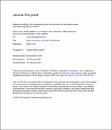Molecular profiling of the metaplastic spindle cell carcinoma of the breast reveals potentially targetable biomarkers

Date
2020-02-27Author
Semir, VranicStafford, Phillip
Palazzo, Juan
Skenderi, Faruk
Swensen, Jeffrey
Xiu, Joanne
Spetzler, David
Gatalica, Zoran
...show more authors ...show less authors
Metadata
Show full item recordAbstract
IntroductionSpindle cell carcinoma is a rare subtype of metaplastic breast cancer (MBC), with triple-negative (TNBC: ER-/PR-/Her2-) phenotype. It is associated with a marked resistance to conventional chemotherapy and has overall poor outcome. Materials and MethodsTwenty-three pure spindle cell carcinomas of the breast (18 primary and 5 recurrent/metastatic) were comprehensively explored for biomarkers of immuno-oncology (I-O) and targeted therapies using immunohistochemistry and DNA/RNA sequencing. ResultsThe majority (21/23) of spindle cell carcinomas were TNBC. Estrogen and androgen receptors expression above the therapeutic thresholds were detected in two cases, each. Pathogenic gene mutations were identified in 21/23 cases including PIK3CA, TP53, HRAS, NF1, and PTEN. One case with matched pre- and post-chemotherapy samples exhibited a consistent mutational profile (PIK3CA and HRAS mutations) in both samples. Gene amplifications were present in five cases including one case without detectable mutations. The spindle cell carcinomas cohort had consistently low total mutational burden (all below 80th percentile for the entire TNBC cohort). All tumors were microsatellite stable. PD-L1 expression was observed on both tumor cells (TC, in 7/21 cases), and in tumor infiltrating immune cells (IC, 2/21 cases). ConclusionsSpindle cell carcinomas are characterized by targetable molecular alterations in the majority of cases, but due to the lack of uniform findings, individual patient profiling is necessary. Detection of individual combinations of biomarkers should improve treatment options for this rare, but aggressive disease.
Collections
- Medicine Research [1913 items ]


